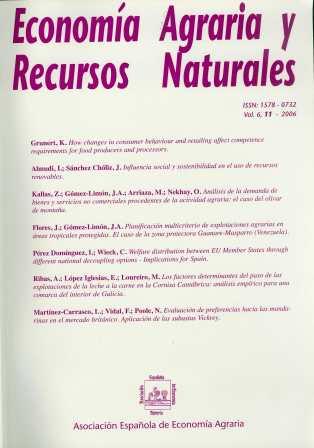Distribución de bienestar económico entre Estados Miembros ante distintas opciones de desacoplamiento en el marco de la nueva PAC - Consecuencias para España
Keywords:
Common Agricultural Policy, Partial equilibrium analysis, Modelling, Decoupling, Welfare analysis.Abstract
Este trabajo modeliza los efectos en el bienestar económico derivados de distintas opciones de desacoplamiento de las primas contenidas en la reforma de la Política Agraria Común aprobada los Acuerdos de Luxemburgo en 2003. Se observa como bajo un escenario de pleno esacoplamiento, los precios agrarios evolucionan más favorablemente que bajo un desacoplamiento parcial debido a una caída de la producción más pronunciada. El uso del mecanismo de desacoplamiento parcial permite a los Estados Miembros mantener determinados cultivos en zonas marginales, lo que resulta en una solución no óptima. Si los demás países siguieran el mismo camino de reforma, podría surgir un problema tipo «dilema del prisionero». La opción de desacoplamiento parcial aparecería como la opción preferida desde el punto de vista individual al asegurar una mayor producción doméstica y altos precios de producción. No obstante, a nivel agregado, el resultado sería una reducción de renta de consumidores y contribuyentes.Downloads
Published
2011-10-18
Issue
Section
Articles
License
Assignment of publishing rights for accepted manuscripts: Authors will assign to the Spanish Association of Agricultural Economics (Asociación Española de Economía Agraria, AEEA) the copyright of the manuscript and any supplemental tables, illustrations or other information submitted therewith that are intended for publication as part of or as a supplement to the manuscript in all forms and media (whether now known or hereafter developed), throughout the world, in all languages, for the full term of copyright, effective when and if the article is accepted for publication. No revisions, additional terms or addenda to this Agreement can be accepted without our express written consent.

